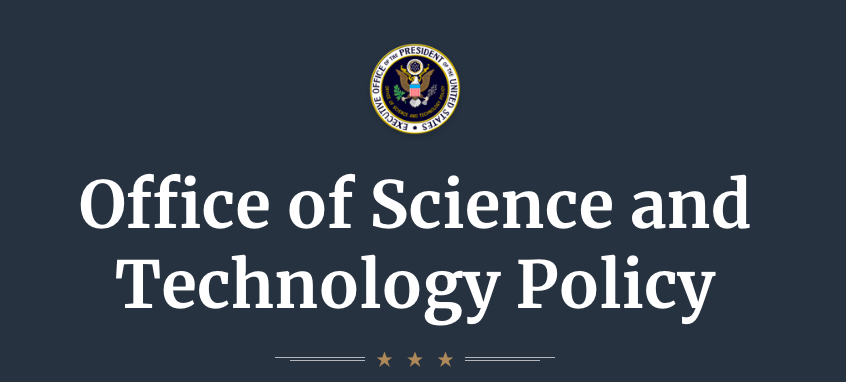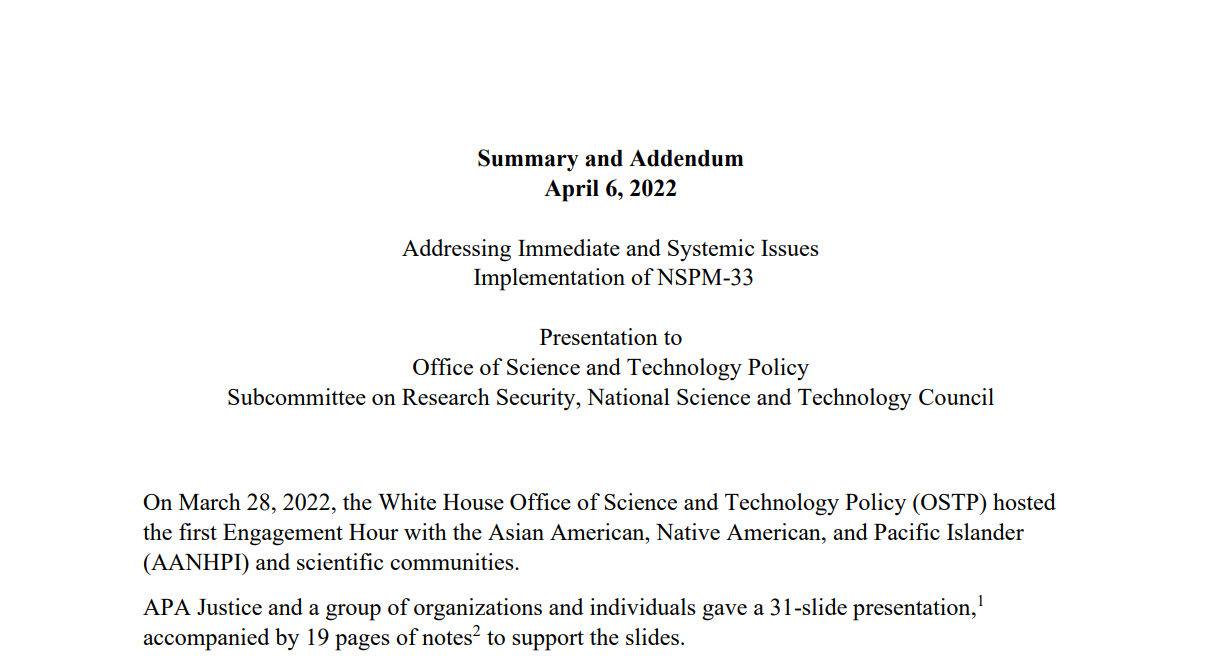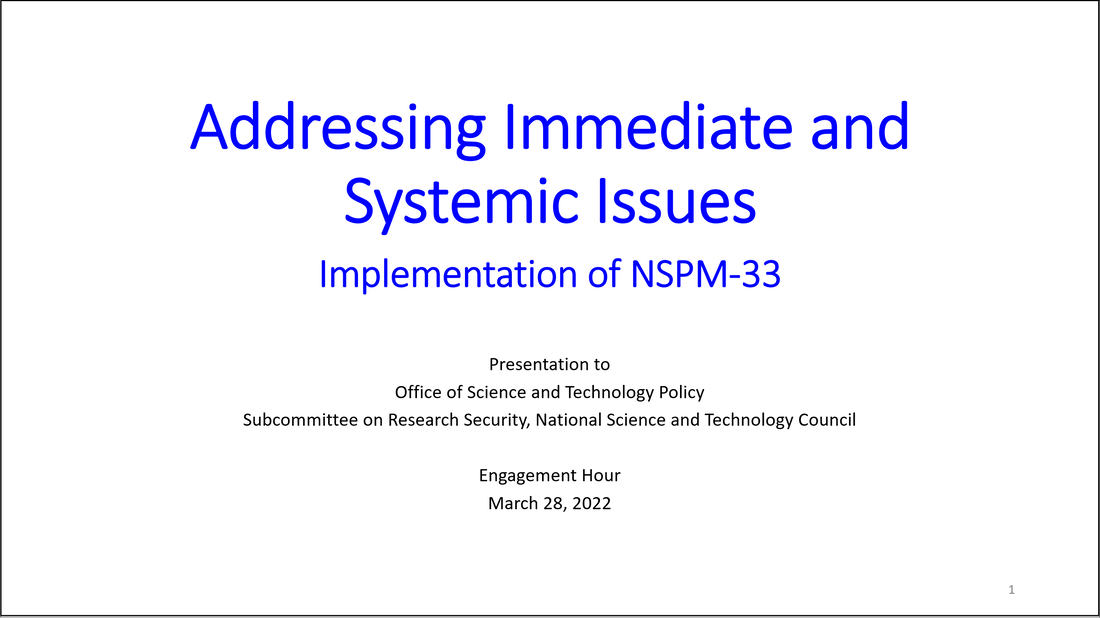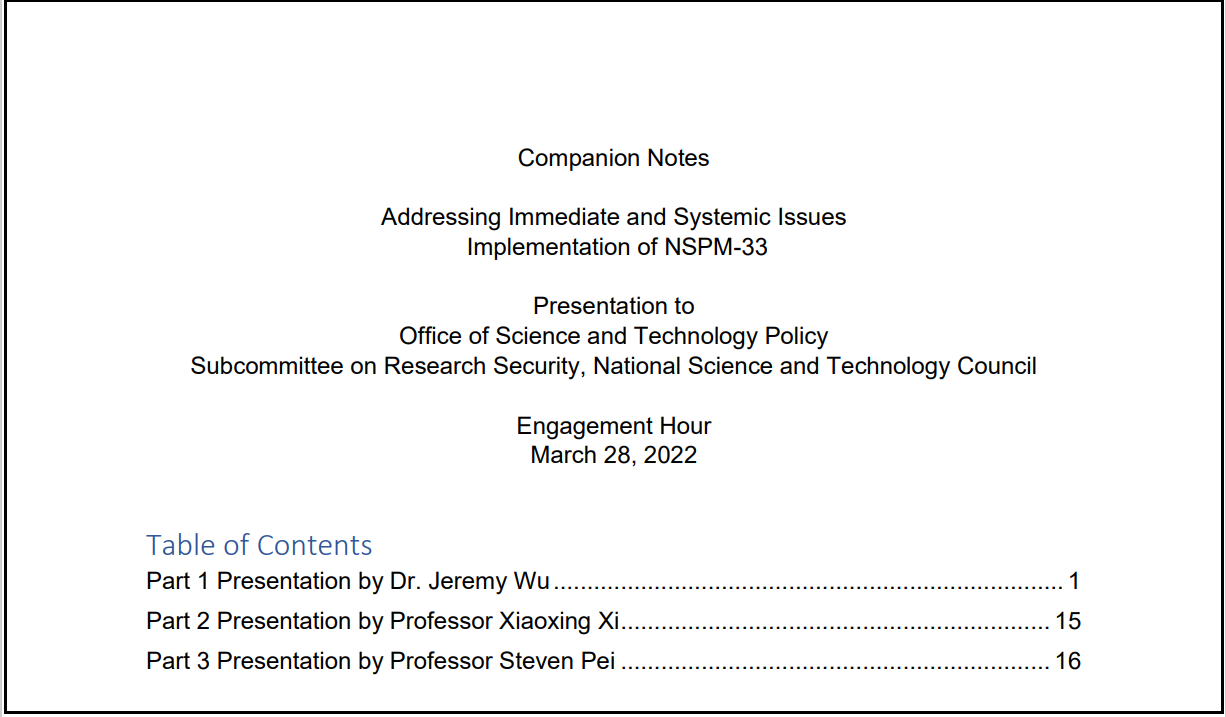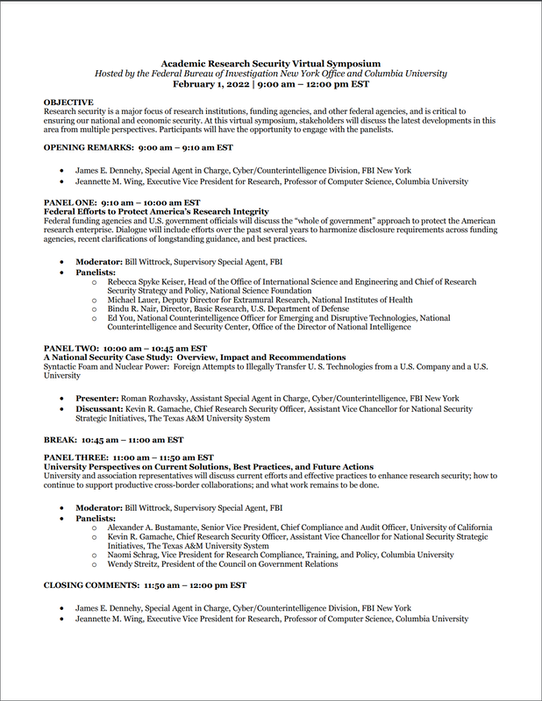2022/10/31 APA Justice: Comments on Federal Register Notice 2022-18746 Agency Information Collection Activities: Request for Comment Regarding Common Disclosure Forms for the Biographical Sketch and Current and Pending (Other) Support
2022/10/31 Asian American Scholar Forum: National Science Foundation (NSF) Request for Public Comment on Common Disclosure Forms for the Biographical Sketch and Current and Pending (Other) Support Sections of a Research Application On Behalf of the National Science and Technology Council’s (NSTC) Research Security Subcommittee
2022/10/31 Asian American Scholar Forum: National Science Foundation (NSF) Request for Public Comment on Common Disclosure Forms for the Biographical Sketch and Current and Pending (Other) Support Sections of a Research Application On Behalf of the National Science and Technology Council’s (NSTC) Research Security Subcommittee
Summary and Presentation to OSTP on March 28, 2022
|
|
On April 6, 2022, APA Justice and a group of organizations and individuals submitted a summary and addendum to the White House Office of Science and Technology Policy (OSTP) to memorialze the Engagement Hour presentation and discussion held on March 28, 2022.
The OSTP Engagement Hour was the first of its kind with the Asian American, Native American, and Pacific Islander (AANHPI) and scientific communities. During the Engagement Hour, APA Justice and a group of participating organizations and individuals gave a presentation titled "Addressing Immediate and Systemic Issues: Implementation of NSPM-33," accompanied by 19 pages of notes to support the slides. By aligning our shared principles and values with background and context, we seek actions to address immediate and systemic issues in the implementation of National Security Presidential Memorandum 33 (NSPM-33). The summary includes 8 sections:
The 9-th and last section covers discussions and additional citations, comments, and developments during and after the Engagement Hour. The series of Engagement Hours will run through the end of May 2022. We anticipate that this is the beginning of a transparent and consultative process with OSTP and federal agencies. Links and References 2022/04/06 APA Justice: Summary and Addendum Addressing Immediate and Systemic Issues - Implementation of NSPM-33 2022/03/28 APA Justice: Addressing Immediate and Systemic Issues - Implementation of NSPM-33 APA Justice: Companion Notes Addressing Immediate and Systemic Issues - Implementation of NSPM-33 |
Feedback to OSTP on Implementation Guidance to NSPM-33
|
On February 1, 2022, a symposium on Academic Research Security was hosted by Columbia University in partnership with the Federal Bureau of Investigations (FBI) New York Office. It was described as an update on how universities and the U.S. government are working together to protect and secure the American research enterprise. Faculty members were excluded from the symposium.
On February 8, 2022, APA Justice requested OSTP to provide clarification about the role of the FBI and the following questions:
On February 17, 2022, OSTP responded: "OSTP did not organize or participate in the symposium. However, participants at the symposium included two co-chairs of the NSTC Subcommittee on Research Security, Dr. Rebecca Keiser at NSF and Dr. Michael Lauer at NIH. As memorialized in the Foreword to the NSPM-33 Implementation Guidance, it is critical that policies related to research security 'do not fuel xenophobia or prejudice.' If there is a desire for the FBI to hold a briefing with specific AANHPI organizations, OSTP is willing to inquire about that." |
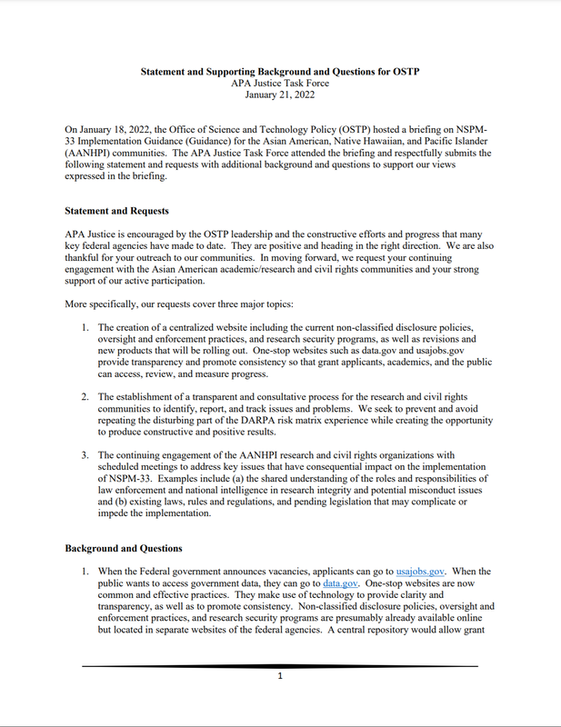 Click image to read the letter
Click image to read the letter
On January 4, 2022, the National Science and Technology Council (NSTC) released Guidance for Implementing National Security Presidential Memorandum 33 (NSPM-33). The stated goal of the Guidance is to provide clear and effective rules for ensuring research security and researcher responsibilities in the implementation of NSPM-33. On the same day, Dr. Eric Lander, The President’s Science Advisor and Director of Office of Science and Technology Policy (OSTP), posted a blog.
On January 18, 2022, OSTP hosted a briefing on the Guidance for the Asian American, Native Hawaiian, and Pacific Islander (AANHPI) communities. APA Justice participated and spoke in the briefing.
On January 21, 2022, APA Justice submitted a statement and requests with additional background and questions to support our views expressed in the briefing. More specifically, the APA Justice requests cover three major topics:
Background and Questions
When the Federal government announces vacancies, applicants can go to usajobs.gov. When the public wants to access government data, they can go to data.gov. One-stop websites are now common and effective practices. They make use of technology to provide clarity and transparency, as well as to promote consistency. Non-classified disclosure policies, oversight and enforcement practices, and research security programs are presumably already available online but located in separate websites of the federal agencies. A central repository would allow grant applicants, academics, and the public to access, review, and measure progress of the implementation of NSPM-33.
Question: Will OSTP commit to stand up such an initial informational website in the next 120 days of the development period?
On the day before the Guidance was released, Professor Ed Lazowska of the University of Washington described his efforts to correct the original version of the DARPA risk matrix in an APA Justice monthly meeting. It was disturbing to hear the many layers he went through with high level officials of multiple agencies and organizations before a positive result was achieved. It is difficult to envision the ad hoc steps taken by Professor Lazowska can be repeated and sustained when another similar situation arises.
We are glad to hear in the briefing that the original DARPA risk matrix was recognized to be a regrettable mistake, but we still have concerns about the matrix approach itself.
For example, according to the Science Magazine, the DARPA approach “could be adopted by NIH or NSF.” At the same time, the Department of Energy is also reportedly working on a different risk matrix based on specific technologies of concern, rather than examining the foreign ties of the leading scientists on the project. Each may have different civil rights implications and consequences on Chinese American scientists, but they may not be represented at the table.
Questions: Going forward, how will OSTP establish a transparent and accountable process involving the Asian American community to allow direct or coordinated consultation on identified issues? Has OSTP decided on whether the risk matrix is the approach to be taken by NIH, NSF, and other civilian funding agencies? How will the perspectives of the Chinese American scientists be represented in this and other similar decisions?
We appreciate and agree with Dr. Lander’s Foreword in the Guidance: “if our policies to address those actions significantly diminish our superpower of attracting global scientific talent — or if they fuel xenophobia against Asian Americans — we will have done more damage to ourselves than any competitor or adversary could.”
We also applaud the Guidance’s requirement that “[a]gencies must implement NSPM-33 provisions and related requirements in a nondiscriminatory manner that does not stigmatize or treat unfairly members of the research community, including members of ethnic or racial minority groups.”
However, law enforcement and national intelligence agencies that have caused fear and suspicion and inflicted pain and suffering under the “China Initiative” for the past three years were noticeably absent in the briefing although the Departments of Homeland Security and Justice, the Federal Bureau of Investigations, and the Office of the Director of National Intelligence are listed as members of the Subcommittee on Research Security.
According to the Guidance, “[a]gencies should engage with the research community throughout the implementation process and should consider stakeholder and community input and concerns. Engagement should include testing, piloting, and the solicitation of feedback during development of policies and forms, where practicable.” It is unclear how this is being accomplished successfully without the participation of and coordination with law enforcement and national intelligence agencies.
The Guidance also states that “[a]gencies should integrate implementation of NSPM-33 requirements with implementation of applicable statutes, including Sec. 223 of the National Defense Authorization Act (NDAA) for Fiscal Year (FY) 2021 and Section 117 of the Higher Education Act (HEA) of 1965, as amended.”
Section 5712 of the FY 2020 National Defense Authorization Act (NDAA) (pages 989-990 https://bit.ly/3eVEHgY) also mandated the Director of National Intelligence, acting through the Office of Civil Liberties, Privacy, and Transparency, to submit an unclassified report to the congressional intelligence committees containing (1) a review of how the policies, procedures, and practices of the intelligence community that govern the intelligence activities and operations targeting the People’s Republic of China affect policies, procedures, and practices relating to the privacy and civil liberties of Americans of Chinese descent who may be targets of espionage and influence operations by China; and (2) recommendations to ensure that the privacy and civil liberties of Americans of Chinese descent are sufficiently protected. This report is now overdue by more than 18 months. We recommend that this report should be taken into account by the federal funding agencies.
We strongly recommend the continuing engagement with the AANHPI research and civil rights organizations by scheduling multiple meetings in the next 120-day period to address key issues that have consequential impact on the implementation of NSPM-33.
Questions:
On January 18, 2022, OSTP hosted a briefing on the Guidance for the Asian American, Native Hawaiian, and Pacific Islander (AANHPI) communities. APA Justice participated and spoke in the briefing.
On January 21, 2022, APA Justice submitted a statement and requests with additional background and questions to support our views expressed in the briefing. More specifically, the APA Justice requests cover three major topics:
- The creation of a centralized website.
- The establishment of a transparent and consultative process for the research and civil rights communities to identify, report, and track issues and problems.
- The continuing engagement of the AANHPI research and civil rights organizations with scheduled meetings to address key issues that have consequential impact on the implementation of NSPM-33.
Background and Questions
When the Federal government announces vacancies, applicants can go to usajobs.gov. When the public wants to access government data, they can go to data.gov. One-stop websites are now common and effective practices. They make use of technology to provide clarity and transparency, as well as to promote consistency. Non-classified disclosure policies, oversight and enforcement practices, and research security programs are presumably already available online but located in separate websites of the federal agencies. A central repository would allow grant applicants, academics, and the public to access, review, and measure progress of the implementation of NSPM-33.
Question: Will OSTP commit to stand up such an initial informational website in the next 120 days of the development period?
On the day before the Guidance was released, Professor Ed Lazowska of the University of Washington described his efforts to correct the original version of the DARPA risk matrix in an APA Justice monthly meeting. It was disturbing to hear the many layers he went through with high level officials of multiple agencies and organizations before a positive result was achieved. It is difficult to envision the ad hoc steps taken by Professor Lazowska can be repeated and sustained when another similar situation arises.
We are glad to hear in the briefing that the original DARPA risk matrix was recognized to be a regrettable mistake, but we still have concerns about the matrix approach itself.
For example, according to the Science Magazine, the DARPA approach “could be adopted by NIH or NSF.” At the same time, the Department of Energy is also reportedly working on a different risk matrix based on specific technologies of concern, rather than examining the foreign ties of the leading scientists on the project. Each may have different civil rights implications and consequences on Chinese American scientists, but they may not be represented at the table.
Questions: Going forward, how will OSTP establish a transparent and accountable process involving the Asian American community to allow direct or coordinated consultation on identified issues? Has OSTP decided on whether the risk matrix is the approach to be taken by NIH, NSF, and other civilian funding agencies? How will the perspectives of the Chinese American scientists be represented in this and other similar decisions?
We appreciate and agree with Dr. Lander’s Foreword in the Guidance: “if our policies to address those actions significantly diminish our superpower of attracting global scientific talent — or if they fuel xenophobia against Asian Americans — we will have done more damage to ourselves than any competitor or adversary could.”
We also applaud the Guidance’s requirement that “[a]gencies must implement NSPM-33 provisions and related requirements in a nondiscriminatory manner that does not stigmatize or treat unfairly members of the research community, including members of ethnic or racial minority groups.”
However, law enforcement and national intelligence agencies that have caused fear and suspicion and inflicted pain and suffering under the “China Initiative” for the past three years were noticeably absent in the briefing although the Departments of Homeland Security and Justice, the Federal Bureau of Investigations, and the Office of the Director of National Intelligence are listed as members of the Subcommittee on Research Security.
According to the Guidance, “[a]gencies should engage with the research community throughout the implementation process and should consider stakeholder and community input and concerns. Engagement should include testing, piloting, and the solicitation of feedback during development of policies and forms, where practicable.” It is unclear how this is being accomplished successfully without the participation of and coordination with law enforcement and national intelligence agencies.
The Guidance also states that “[a]gencies should integrate implementation of NSPM-33 requirements with implementation of applicable statutes, including Sec. 223 of the National Defense Authorization Act (NDAA) for Fiscal Year (FY) 2021 and Section 117 of the Higher Education Act (HEA) of 1965, as amended.”
Section 5712 of the FY 2020 National Defense Authorization Act (NDAA) (pages 989-990 https://bit.ly/3eVEHgY) also mandated the Director of National Intelligence, acting through the Office of Civil Liberties, Privacy, and Transparency, to submit an unclassified report to the congressional intelligence committees containing (1) a review of how the policies, procedures, and practices of the intelligence community that govern the intelligence activities and operations targeting the People’s Republic of China affect policies, procedures, and practices relating to the privacy and civil liberties of Americans of Chinese descent who may be targets of espionage and influence operations by China; and (2) recommendations to ensure that the privacy and civil liberties of Americans of Chinese descent are sufficiently protected. This report is now overdue by more than 18 months. We recommend that this report should be taken into account by the federal funding agencies.
We strongly recommend the continuing engagement with the AANHPI research and civil rights organizations by scheduling multiple meetings in the next 120-day period to address key issues that have consequential impact on the implementation of NSPM-33.
Questions:
- What are the roles and responsibilities of law enforcement and national intelligence agencies in the administrative processes addressing research integrity and misconduct issues? In particular have they agreed to a secondary role instead of their “first responder” role under the “China Initiative?”
- Are law enforcement and national intelligence agencies also expected to ensure that their policies do not fuel xenophobia or prejudice? If so, how will they be held accountable?
- Are there any applicable statutes, rules and regulations, or pending legislation that may impede, interfere, or conflict with the implementation of NSPM-33?
- When does OSTP plan to fully engage the White House Initiative on AANHPI in communicating with the entire communities?
APA Justice Comments to OSTP on NSPM-33
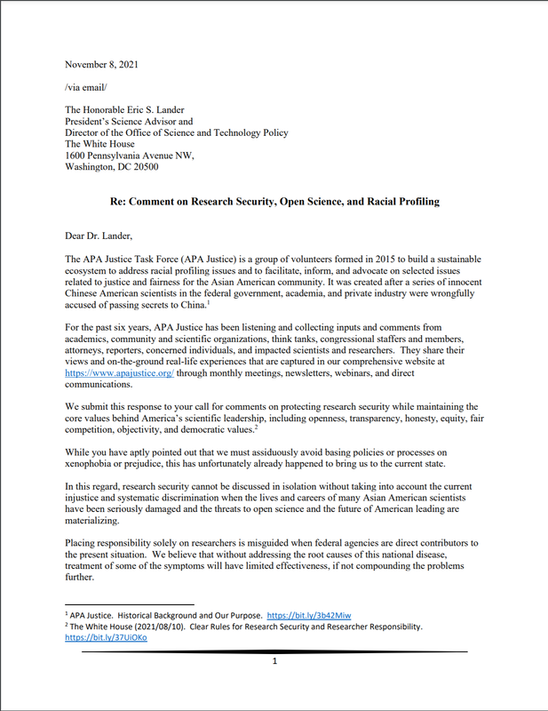 Click image to read the letter
Click image to read the letter
On November 8, 2021, APA Justice submitted its comments on National Security Presidential Memorandum (NSPM-33) to the Office of Science and Technology Policy (https://bit.ly/31P9DLL).
Research security cannot be discussed in isolation without taking into account the current injustice and systematic discrimination when the lives and careers of many Asian American scientists have been seriously damaged and the threats to open science and the future of American leadership are materializing.
Placing responsibility solely on researchers is misguided when federal agencies are direct contributors to the present situation. We believe that without addressing the root causes of this national disease, treatment of some of the symptoms will have limited effectiveness, if not compounding the problems further.
We respectfully request OSTP to take a holistic approach to balance research security, open science, and protection of civil rights and civil liberties of Asian Americans and immigrant communities by honestly addressing the existing conditions and the core systemic causes and upholding the fundamental values of America’s scientific leadership.
In summary, we urge OSTP to
2021/11/08 APA Justice: Comment on Research Security, Open Science, and Racial Profiling
Research security cannot be discussed in isolation without taking into account the current injustice and systematic discrimination when the lives and careers of many Asian American scientists have been seriously damaged and the threats to open science and the future of American leadership are materializing.
Placing responsibility solely on researchers is misguided when federal agencies are direct contributors to the present situation. We believe that without addressing the root causes of this national disease, treatment of some of the symptoms will have limited effectiveness, if not compounding the problems further.
We respectfully request OSTP to take a holistic approach to balance research security, open science, and protection of civil rights and civil liberties of Asian Americans and immigrant communities by honestly addressing the existing conditions and the core systemic causes and upholding the fundamental values of America’s scientific leadership.
In summary, we urge OSTP to
- Harmonize disclosure policy across funding agencies to minimize the confusion to researchers.
- Set the requirement of disclosure at a reasonable level to avoid overly burden on the researcher.
- Leave the oversight and enforcement functions of the universities to funding agencies, not law enforcement. The universities and research institutions do not have the resource and appropriate level of authority to adopt and implement the principles and best practices of evidence-based policymaking. The Department of Justice does not have the knowledge and expertise to make judgment on leading-edge science and technology research and the complexity of international collaboration.
- Support the call to end the “China Initiative” to remove the oversight and enforcement roles and responsibilities from the Department of Justice.
- Lead an independent review of the ongoing investigations and practices by federal agencies to repair the damage that the “China Initiative” has done.
2021/11/08 APA Justice: Comment on Research Security, Open Science, and Racial Profiling
OSTP Starts to Set Clear and Consistent Rules
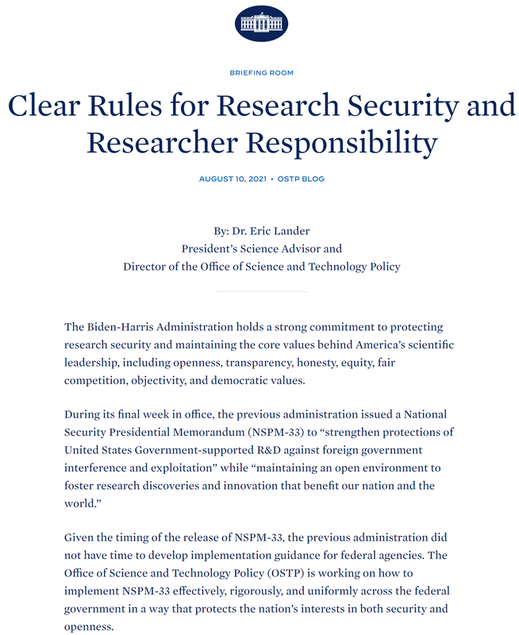 Click image to read the blog
Click image to read the blog
On August 10, 2021, Dr. Eric Lander, Director of the Office of Science and Technology (OSTP) at the White House, released a statement on Clear Rules for Research Security and Researcher Responsibility. OSTP is working on the implementation of a National Security Presidential Memorandum (NSPM-33), issued under the Trump administration, to “strengthen protections of United States Government-supported R&D against foreign government interference and exploitation” while “maintaining an open environment to foster research discoveries and innovation that benefit our nation and the world.”
Over the next 90 days, OSTP will work with the National Security Council staff, fellow Cabinet agencies, and other federal agencies through the National Science and Technology Council over the next 90 days to address three major areas:
1. Disclosure Policy,
2. Oversight and Enforcement, and
3. Research Security Programs.
Three principles are outlined to guide this work:
1. Protect America’s Security and Openness,
2. Be Clear, and
3. Ensure Policies Do Not Fuel Xenophobia or Prejudice.
On the last point, Dr. Lander's statement said,
"We have to assiduously avoid basing policies or processes on prejudice — including those that could fuel anti-Asian sentiments or xenophobia. Prejudice is fundamentally unacceptable, and will backfire because it will make it harder to attract the best scientific minds from around the world. We must affirm the integral role of Asian-Americans, Native Hawaiians, Pacific Islanders, and people of all national origins in this country; welcome international students and scholars; and avoid casting aspersions on people because of their identity or origins.
In designing policies, we should also avoid actions that are pointless or performative, such as requiring scientists to return honorary degrees from Chinese universities. And, it should never be acceptable to target scientists for investigation based on their race or ethnicity. In protecting our nation, we must uphold its fundamental values."
OSTP invites ideas on NSPM-33 implementation by email to [email protected].
Links and References
2021/08/16 Fortune: U.S. universities face another school year of too few Chinese students
Latitudes #128: Political Awakening Edition
2021/08/13 Washington Post: In China, the dream of an American education loses some of its gleam
2021/08/10 White House: Clear Rules for Research Security and Research Responsibility
The Guardian editorial: The Guardian view on anti-Chinese suspicion: target espionage, not ethnicities
2021/08/09 APS News: Current US Policy on China: The Risk to Open Science
CNN: A Trump-era policy that shut out top Chinese students could be hurting America more than Beijing
2021/08/07 Forbes: U.S. Universities Fall Further Behind China In Production Of STEM PhDs
2021/07/27 Science: U.S. visa rejections shattered Chinese students’ dreams. Now, they’re fighting back
Over the next 90 days, OSTP will work with the National Security Council staff, fellow Cabinet agencies, and other federal agencies through the National Science and Technology Council over the next 90 days to address three major areas:
1. Disclosure Policy,
2. Oversight and Enforcement, and
3. Research Security Programs.
Three principles are outlined to guide this work:
1. Protect America’s Security and Openness,
2. Be Clear, and
3. Ensure Policies Do Not Fuel Xenophobia or Prejudice.
On the last point, Dr. Lander's statement said,
"We have to assiduously avoid basing policies or processes on prejudice — including those that could fuel anti-Asian sentiments or xenophobia. Prejudice is fundamentally unacceptable, and will backfire because it will make it harder to attract the best scientific minds from around the world. We must affirm the integral role of Asian-Americans, Native Hawaiians, Pacific Islanders, and people of all national origins in this country; welcome international students and scholars; and avoid casting aspersions on people because of their identity or origins.
In designing policies, we should also avoid actions that are pointless or performative, such as requiring scientists to return honorary degrees from Chinese universities. And, it should never be acceptable to target scientists for investigation based on their race or ethnicity. In protecting our nation, we must uphold its fundamental values."
OSTP invites ideas on NSPM-33 implementation by email to [email protected].
Links and References
2021/08/16 Fortune: U.S. universities face another school year of too few Chinese students
Latitudes #128: Political Awakening Edition
2021/08/13 Washington Post: In China, the dream of an American education loses some of its gleam
2021/08/10 White House: Clear Rules for Research Security and Research Responsibility
The Guardian editorial: The Guardian view on anti-Chinese suspicion: target espionage, not ethnicities
2021/08/09 APS News: Current US Policy on China: The Risk to Open Science
CNN: A Trump-era policy that shut out top Chinese students could be hurting America more than Beijing
2021/08/07 Forbes: U.S. Universities Fall Further Behind China In Production Of STEM PhDs
2021/07/27 Science: U.S. visa rejections shattered Chinese students’ dreams. Now, they’re fighting back
